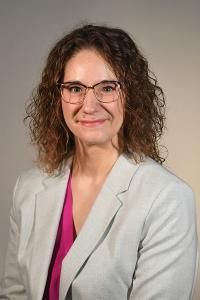Profile: Rebecca Hough MD, PhD
Dedicated Scientist, Compassionate Physician
Children who arrive in the pediatric intensive care unit (PICU) often come with serious and complex health conditions, and with parents and other family members who are fearful, but hopeful. Caring for families through these extreme and challenging moments inspired Rebecca Hough, MD, PhD to pursue pediatric critical care medicine and become a “pediatric intensivist.”
“As a wife and mother to a one- and a three-year-old, I know patients and families need to feel it’s okay to be scared,” Dr. Hough says, “and I’m with them every step of the way. I give family members a layout of events for each day and answer any questions they have, whether I’m interacting with them in-person or remotely. I explain any relevant technical terms and treatments and remain honest and empathetic about their child’s progress.”
Dr. Hough is not only a compassionate clinician, but is also a lung biologist with a special interest in the molecular mechanisms of acute lung injury and acute respiratory distress syndrome (ARDS). Common causes of ARDS include widespread infection of the bloodstream (sepsis), inhalation of harmful substances (including vaping), severe pneumonia, trauma to the head or chest, and recently, COVID-19. Patients with ARDS develop widespread inflammation and fluid buildup (edema) in the lungs, which prevents oxygen from crossing the lung surface into the bloodstream.
To learn what is happening at the cellular level during ARDS, Dr. Hough studied a highly specialized technique, in situ imaging of mouse lungs, under the mentorship of Columbia’s renowned lung biologist Jahar Bhattacharya, MD, DPhil. Drawing from this technique in her research now, she uses microscopy of live mouse lungs to view in real time individual alveoli, the tiny sacs where gas exchange occurs, and the capillaries that surround them.
Dr. Hough recently published a major new finding showing just how alveoli become damaged during ARDS. Mitochondria (energy-producing organelles) in the cells lining capillaries adjoining the alveoli fail, due to activation of a specific mitochondrial protein. Dr. Hough was able to block this protein genetically, and observed that pulmonary edema did not develop. Dr. Hough’s work may open the door to new molecular targets for therapy in people with lung injury. And since ARDS can also develop as a result of COVID-19, Dr. Hough’s work has become particularly relevant.
The importance of Dr. Hough’s research was recently recognized by the department with one of Pediatrics’ inaugural 2019 Innovation Nucleation Fund awards, and in 2020 she was one of four researchers at Columbia’s Vagelos College of Physicians & Surgeons to receive a Gerstner Scholar award.
Dr. Hough originally planned to go into internal medicine and treat adults, but her experience in the Medical Scientist Training Program at the University of Wisconsin School of Medicine and Public Health from 2002-2010 changed her mind. “There was a situation where we were taking care of an infant who had an arrhythmia. His heart was beating very rapidly, his liver had become enlarged, and his lungs were filling with fluid. We were able to provide him with a breathing tube, and with help from a cardiologist, restore his heart’s normal rhythm with a dose of medication. To see the child improve in just a couple of hours—to the point that he did not need a breathing tube—was extremely rewarding, and contributing to that victory was incredible.”
Dr. Hough went on to complete her residency and pediatric critical care medicine fellowship at Columbia, and during her fellowship obtained a training grant (T32) from the National Institutes of Health to pursue her interest in ARDS. As she continues studying ARDS, Dr. Hough hopes she can contribute to targeted therapies that will mitigate the potential for death and long-term lung damage from this severe and often fatal condition.

